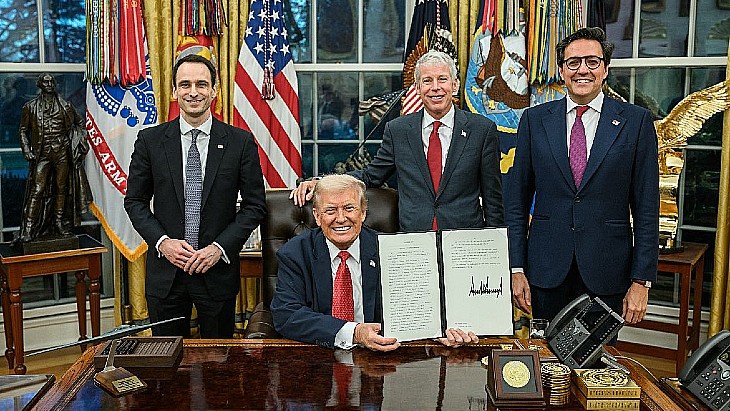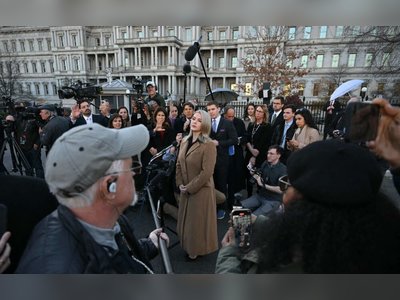
Trump Launches “Genesis Mission” to Supercharge U.S. AI-Driven Science and Energy Innovation
New executive order mobilises national labs, supercomputers and private partners to accelerate breakthroughs in energy, biotech, fusion and national-security research
President Donald Trump on 24 November signed an executive order establishing the Genesis Mission — a sweeping national strategy aimed at harnessing artificial intelligence to dramatically accelerate scientific discovery, strengthen U.S. energy leadership and bolster national security.
The effort positions itself as a pivotal leap in American research infrastructure, likened in scope to the Manhattan Project and the space race.
([The White House][1])
Under the new framework, the U.S. Department of Energy (DOE) will mobilise its 17 national laboratories, in partnership with academic institutions, private-sector tech firms and government agencies, to build a unified AI-driven scientific platform.
This “closed-loop AI experimentation platform” is intended to combine supercomputing power, large federally-held data sets and advanced experimental infrastructure to enable scientific projects — from fusion reactor design and quantum computing research to biotech, materials science, semiconductor development, and grid modernisation.
([The White House][1])
Energy Secretary Chris Wright described the initiative as giving the United States “an integrated discovery platform” through which breakthroughs once measured in decades could be accelerated into years, months or even days.
He framed the Genesis Mission as essential for securing U.S. dominance in AI-powered science, delivering decisive advances in energy independence, climate-resilient infrastructure, and technological sovereignty.
([NJBIZ][2])
The mission explicitly identifies one of its earliest priorities as nuclear energy: both nuclear fusion and fission are included among the “science and technology challenges of national importance” that the Secretary of Energy must prioritise within 60 days.
Beyond energy, the mission spans a broad array of strategic areas including biotechnology, critical materials, space science, quantum information, microelectronics and other foundational technologies.
([The White House][1])
Operational structure for the mission will be coordinated by the White House’s Office of Science and Technology Policy.
Under-Secretary for Science Darío Gil is tapped to lead the scientific and technical execution, working closely with DOE labs, private partners and academic institutions.
The administration also encourages public-private collaboration, signalling opportunities for tech companies and industries to contribute computing power, infrastructure and innovation to the unified platform.
([NJBIZ][2])
Observers note that Genesis Mission represents a significant shift in federal research policy — redirecting the nation’s substantial, previously siloed scientific datasets and computational resources toward coordinated, AI-driven discovery and development.
Proponents argue this could usher in a new “golden age” of American science, restoring U.S. leadership in critical technologies and energy independence at a time of intensifying global competition.
([The White House][1])
While funding details remain vague and the mission’s broad goals will depend on sustained commitment across administrations, the launch marks a clear declaration of intent: the United States under President Trump is betting on AI not just as a tech industry vector, but as the engine for national scientific and energy transformation.
The success of Genesis Mission will likely determine whether the United States can deliver on its ambitions for a new era of rapid innovation — particularly in fusion energy, quantum technologies and AI-driven materials science — setting a potential template for global scientific competition in the decades ahead.
The effort positions itself as a pivotal leap in American research infrastructure, likened in scope to the Manhattan Project and the space race.
([The White House][1])
Under the new framework, the U.S. Department of Energy (DOE) will mobilise its 17 national laboratories, in partnership with academic institutions, private-sector tech firms and government agencies, to build a unified AI-driven scientific platform.
This “closed-loop AI experimentation platform” is intended to combine supercomputing power, large federally-held data sets and advanced experimental infrastructure to enable scientific projects — from fusion reactor design and quantum computing research to biotech, materials science, semiconductor development, and grid modernisation.
([The White House][1])
Energy Secretary Chris Wright described the initiative as giving the United States “an integrated discovery platform” through which breakthroughs once measured in decades could be accelerated into years, months or even days.
He framed the Genesis Mission as essential for securing U.S. dominance in AI-powered science, delivering decisive advances in energy independence, climate-resilient infrastructure, and technological sovereignty.
([NJBIZ][2])
The mission explicitly identifies one of its earliest priorities as nuclear energy: both nuclear fusion and fission are included among the “science and technology challenges of national importance” that the Secretary of Energy must prioritise within 60 days.
Beyond energy, the mission spans a broad array of strategic areas including biotechnology, critical materials, space science, quantum information, microelectronics and other foundational technologies.
([The White House][1])
Operational structure for the mission will be coordinated by the White House’s Office of Science and Technology Policy.
Under-Secretary for Science Darío Gil is tapped to lead the scientific and technical execution, working closely with DOE labs, private partners and academic institutions.
The administration also encourages public-private collaboration, signalling opportunities for tech companies and industries to contribute computing power, infrastructure and innovation to the unified platform.
([NJBIZ][2])
Observers note that Genesis Mission represents a significant shift in federal research policy — redirecting the nation’s substantial, previously siloed scientific datasets and computational resources toward coordinated, AI-driven discovery and development.
Proponents argue this could usher in a new “golden age” of American science, restoring U.S. leadership in critical technologies and energy independence at a time of intensifying global competition.
([The White House][1])
While funding details remain vague and the mission’s broad goals will depend on sustained commitment across administrations, the launch marks a clear declaration of intent: the United States under President Trump is betting on AI not just as a tech industry vector, but as the engine for national scientific and energy transformation.
The success of Genesis Mission will likely determine whether the United States can deliver on its ambitions for a new era of rapid innovation — particularly in fusion energy, quantum technologies and AI-driven materials science — setting a potential template for global scientific competition in the decades ahead.











